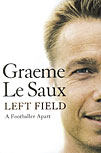 A Footballer Apart
A Footballer Apart
by Graeme Le Saux
Harper Sport, £8.99
Reviewed by Mike Ticher
From WSC 251 January 2008
Graeme Le Saux is not a particularly remarkable man, and this is not a particularly remarkable book, but it throws up intriguing issues about football culture over the past 20 years. The contrast between his ordinariness and the extraordinary treatment he received tells us a lot about what a closed and vicious world football can be.
The Channel Islander’s two spells at Chelsea give him an ideal view of how dramatically that world changed. In the first, from 1987 to 1993, he was persistently bullied by hard men such as Peter Nicholas and Graham Roberts, labelled as gay and told by the coach Bobby Campbell he was “just the product of a German rape”. Le Saux talks sensitively about the torment of the gay taunts, initially sparked by a holiday with Ken Monkou (who, as a foreigner with a Grace Jones haircut, was also clearly suspect).
When he left Blackburn in 1997 it was to join Ruud Gullit’s side, populated by Zola, Vialli et al – having a foreign name and an interest in the wider world no longer made Le Saux a threateningly exotic bloom. But he still faced trouble from opposing fans and players, most famously Robbie Fowler’s arse-pointing exhibition in 1999, a lesson in public humiliation that paradoxically took the sting out of the chants and abuse for the rest of his career.
“I don’t know how much my alienation at the club was about class,” he writes of the first Chelsea spell. I would say it mostly was about class, with a bit of geography and personality thrown in. After all, Pat Nevin beat a path through the same brutal dressing room despite his interests in indie music, art and politics – but coming from Glasgow rather than Jersey must have helped. Le Saux was insecure and over-sensitive, and struggled to come to terms with his mother’s early death and lacked the quick wit that might have made life more tolerable.
It says a lot about Britain that what set Le Saux apart above all was his education (two A-levels). In football that made him an object of contempt and awe, both equally unfounded – at the 1998 World Cup he had to ward off the newly reformed Tony Adams’s quest for knowledge about Jean-Paul Sartre. As BBC viewers will know, Le Saux’s insights into football, let alone philosophy, often appear more sophisticated than they really are because of his habit of using more words than necessary (“I was wholly preoccupied with the magnitude of the prospect of playing for my country”).
The fact that Le Saux is a regular middle-class bloke – albeit with an iron will to succeed – leaves the book struggling for dramatic content beyond the gay question. He always knows when to stop drinking, fails to get into amusing scrapes and settles down to a happy family life. On the football, he fleshes out the familiar image of most of his coaches – he’s particularly good on Glenn Hoddle’s appalling man-management and kooky experiments. He paints convincingly balanced portraits of those he fell out with (Fowler, David Batty, Paul Ince) and does not shy away from his own sometimes prickly attitude.
Anyone who spent so long listening to thousands of people howling that he takes it up the arse should be forgiven for that. It’s to Le Saux’s credit that he came through and arrived at this mature, thoughtful response. Maybe football itself will have come as far when it can accept a player who really is gay.